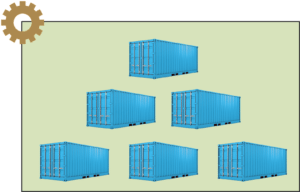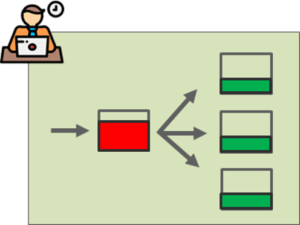DevOps Certification Training
- 187k Enrolled Learners
- Weekend/Weekday
- Live Class
Kubernetes and Docker Swarm are leading container orchestration tools today. So before using them in your prod, you should know what exactly they are and how they work. To understand the very same, read this blog which talks about the performance and usability face-off between Kubernetes vs Docker Swarm.
I will not be talking about what the basics of the two tools in this blog. To read about the basics first, then go through my previous blogs. To read what is Docker, click here. To read what is Kubernetes, click here.
The differences between Kubernetes vs Docker Swarm are briefly summarized in the below table. Detailed explanation is provided later in the blog.
You might also be interested in reading this report which talks about the Top Technical Skills to master in 2018.
| Features | Kubernetes | Docker Swarm |
|---|---|---|
| Installation & Cluster Configuration | Installation is complicated; but once setup, the cluster is very strong | Installation is very simple; but cluster is not very strong |
| GUI | GUI is the Kubernetes Dashboard | There is no GUI |
| Scalability | Highly scalable & scales fast | Highly scalable & scales 5x faster than Kubernetes |
| Auto-Scaling | Kubernetes can do auto-scaling | Docker Swarm cannot do auto-scaling |
| Load Balancing | Manual intervention needed for load balancing traffic between different containers in different Pods | Docker Swarm does auto load balancing of traffic between containers in the cluster |
| Rolling Updates & Rollbacks | Can deploy Rolling updates & does automatic Rollbacks | Can deploy Rolling updates, but not automatic Rollbacks |
| Data Volumes | Can share storage volumes only with other containers in same Pod | Can share storage volumes with any other container |
| Logging & Monitoring | In-built tools for logging & monitoring | 3rd party tools like ELK should be used for logging & monitoring |
I would also like to remind you that, people misunderstand Docker Swarm for Docker. Docker is just a containerization platform. Docker Swarm is a container orchestration platform, the same as Kubernetes. Hence, its only right to compare the two on the same set of parameters. The parameters I will be comparing them against are:

 However, with Kubernetes, the setup is no where as easy as Swarm. You need to run commands to bring up the cluster, then to define your environment, then to define a Pod network (for containers to interact), then to bring up the dashboard, and then finally the cluster would be hosted.
However, with Kubernetes, the setup is no where as easy as Swarm. You need to run commands to bring up the cluster, then to define your environment, then to define a Pod network (for containers to interact), then to bring up the dashboard, and then finally the cluster would be hosted.
A GUI is basically a Dashboard, which can be used to control your cluster effortlessly. No CLI commands hassle, no technical efforts, and simple-English which even professionals from non-technical background can cope with. You can get all this with the Kubernetes dashboard at: localhost:8001.
However, Docker Swarm reply saying, “Sorry, we have no such facility now“. Yes, there is no Dashboard! Which is an upset. But hey, pundits would defend it by saying, if you are dealing with Containers, then your technical enough to deal without a GUI. And, this is also partially true.

Scaling up the number of containers is an eventual need for simply any company. There’s no exception there. And, here both Kubernetes and Swarm hold a firm stand. Neither wins. Kubernetes is slightly better at maintaining the Cluster strength, whereas Swarm is slightly faster at scaling up(5x faster than K8s).
My take on this point is, cluster strength is more important than anything. In Prod, I would rather ensure more stability than agility in scaling. Hence, Kubernetes is my winner.
 The clear winner is Kubernetes. That is because, K8s are intelligent enough to analyze your server load, and scale up or down as per the requirement. There is no need for manual intervention. This is a big help, because the famous “traffic catastrophe” can be completely avoided.
The clear winner is Kubernetes. That is because, K8s are intelligent enough to analyze your server load, and scale up or down as per the requirement. There is no need for manual intervention. This is a big help, because the famous “traffic catastrophe” can be completely avoided.
But Docker Swarm is not the confident defender here. When traffic pours, it crumbles, with no help available. And manual intervention is the only way out (no support for auto scaling).
 Kubernetes is beaten here. At times, you need to manually configure your load balancing settings. Multiple containers are served as 1 Pod. And each service can be defined as a group of Pods. Now, the challenge is to get these Pods to talk to each other as they should be easily discoverable. Since the services are used for discovery, and not their IP addresses, hence the challenge.
Kubernetes is beaten here. At times, you need to manually configure your load balancing settings. Multiple containers are served as 1 Pod. And each service can be defined as a group of Pods. Now, the challenge is to get these Pods to talk to each other as they should be easily discoverable. Since the services are used for discovery, and not their IP addresses, hence the challenge.
Load balancing is simple with Swarm because, Swarm does auto load-balancing. There is no concept of Pods, and hence all the containers discover each other with a network IP address, which happens automatically as long as the nodes are connected to the cluster.
Kubernetes wins here again. In-fact, both K8s and Swarm clusters support the concept of ‘Rolling Updates’ to containers. k8s perform rolling updates to Pods as a whole, while Swarm does it to containers straightaway. Rolling updates is the process of progressively and gradually deploying the updates to existing apps in all containers.
But Swarm is beaten because it does not do automatically Rollbacks. Whenever something goes wrong while deploying your updates, both K8s and Swarm provide an option to Rollback to the previous stable deployment. But, only Kubernetes does auto Rollback in case of a failure condition. The Master of the cluster closely monitors the updates and deployments.
Kubernetes allows us to share storage volumes between multiple containers inside the same Pod. However, Docker Swarm allows us to share storage volumes with any other container. But the advantage with K8s is that, the storage can be easily mounted on local storage, or either on public clouds like AWS, GCP or even on shared networks like NFS.
Kubernetes provides in-built tools for logging and monitoring. Logging helps in quickly analyzing the logs and understanding where the problem lies in case of a failure. Monitoring helps the Master to constantly be aware of the health status of nodes and the services containerized by them. Kubernetes does in-built logging and monitoring. However, with Swarm, we can use 3rd party tools like ELK for this.
So, these are the relevant parameters you have to keep in mind before choosing one between, Kubernetes vs Docker Swarm. Listening to the below video will help you understand the difference better.
If you are interested in learning more about Kubernetes, then you can check out Edureka’s Kubernetes Training Course. If you have a preference between Kubernetes vs Docker Swarm, then we would love to hear your opinion. You can express it in the comment section below.
 Thank you for registering Join Edureka Meetup community for 100+ Free Webinars each month JOIN MEETUP GROUP
Thank you for registering Join Edureka Meetup community for 100+ Free Webinars each month JOIN MEETUP GROUPedureka.co
As per this link from Docker, it does seem to support automatic roll-backs. https://docs.docker.com/v17.12/edge/engine/reference/commandline/service_update/